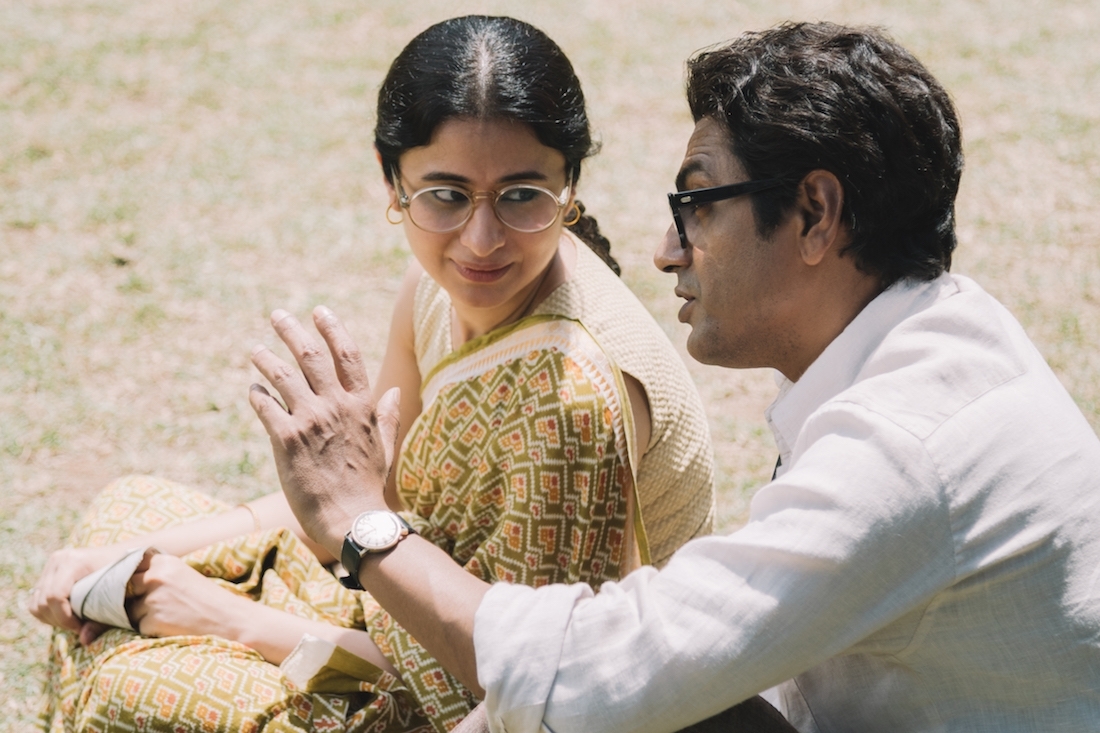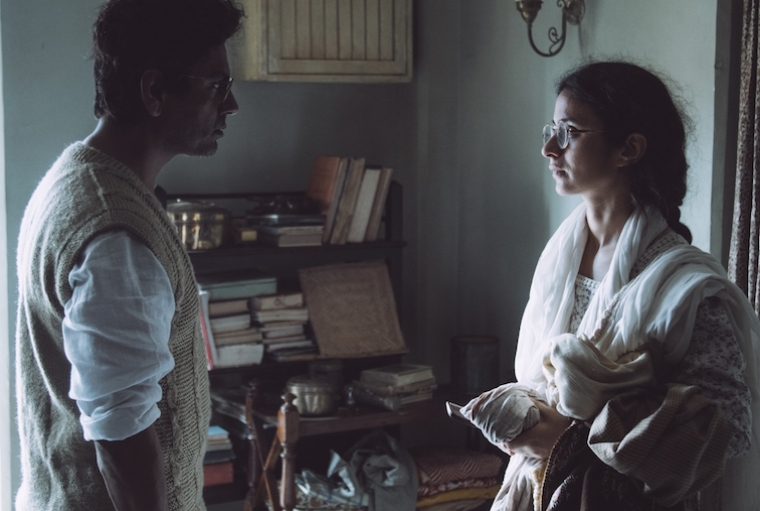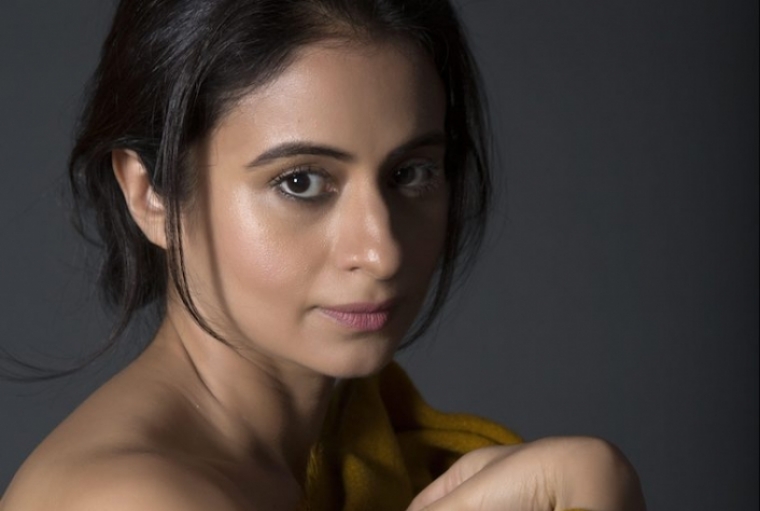
Rasika Dugal as Safia Manto and Nawazuddin Siddiqui as Saadat Hasan Manto in the movie Manto

Rasika Dugal as Safia Manto and Nawazuddin Siddiqui as Saadat Hasan Manto in the movie Manto
Rasika Dugal is one of the most renowned names of Indian theatre, having worked on an array of reputed productions including The Vagina Monologues and one of the most successful Urdu plays, Dastangoi. She has, since her theatre days, worked on critically acclaimed projects across all platforms of entertainment. Having worked on films like Qissa with Irrfan Khan, Tu Hai Mera Sunday which was voted as the most endearing film of 2017 and was most recently featured in Lust Stories in Zoya Akhtar's short film and web shows like Humorously Yours by TVF, Rasika was soon noticed for her brilliance as an actress. She will now soon be seen in her biggest project, Manto by Nandita Das starring opposite Nawazuddin Siddique essaying the role of Manto's wife, Safia. With the release of the highly anticipated movie Manto’s trailer, that made it all the was to Cannes film festival this year, we had a chance to interview the actress regarding her career, her experience of working in Manto and her future projects.
What led you to pursue acting?
It was actually a decision made on a whim and it was not well thought out and I believe that only not well thought-out decisions can lead you to a career in acting because if you actually sit and think about it, it doesn’t actually make any logical sense. So, i was actually in a job, working as a research assistant at that time on a gender and public space project and I realised that everybody around me was very academically oriented and had a background in social sciences and I sort of got bored in the job. I have background in Mathematics and I had also studied social communication, so I didn’t feel like I had anywhere to go from there in the job that I was doing. That’s when I saw that Films and Television Institute of India were restarting their acting course and I had done a fair amount of theatre while my time in college life in Delhi at LSR and I had also studied film as part of my social communication course. So, the interest, the seed I think had been planted in these two situations, so there was fascination for it but never a conscious idea that I would like to pursue it as a career because I come from a family of business people and there are no artists in my family, so I would be the first one. So, it didn’t sort of come in my lifespan at that stage but I was in a phase where I wanted to experiment with anything that came my way or try out a lot of things, so, when I saw that FTI was restarting the course so I thought that lets see, lets try it out and funnily enough I got through. Once I was in the institute I realised that people were there because they had wanted to be actors all their lives and I was probably the only aberration in my class. After six months into the course I knew that this was what I wanted to do for the rest of my life because it felt really really special. I think I hadn’t felt a connection stronger to anything else in my life that acting.

Will you please take us through your acting journey so far, all the challenges and success and memories.
So, when I came out of the film institute you know a lot of people had told me that I should wait for the correct part to come your way and you shouldn’t take up any work . But I never agreed with that and I wanted to do things on my own terms and you know I though that I don’t know if I have the capacity to pull-off a lead role in a film and you know I had learnt at an institute but you know that does not mean that I can pull it off on the job. Also, I didn’t know any other to connect with people apart from my work, I am not very good at being at a party and networking, the only way in which I only connect with people is through my work, otherwise I am very shy. So, I didn’t know how to connect with people in that way and make contacts that would give me big roles when the time comes, so the only way I knew how to connect with people is by working with them. So, I said you know, I will try out smaller parts because that is the only way I know how to interact with people and I’ll see where it goes, like if its a problem for me later then I will figure it out. So, that’s how I started my first film called Anwar while I was still at the film institute and a friend of mine was an AD for the film so she told me that they were auditioning for a part that only had two scenes, but its sort of impactful, so why don’t you come in for it. So, I thought that let me see, let me ask experience how people do auditions, and I did that and I got that part. After that I did about ten films with smaller parts in which I had two three scenes, inspite of being adviced not to I said you know I will carve my way. This you know served me really well because I still meet people who are from there who have then gone on to not getting a lot of work you know.
My first lead part was in a film called Shay that was made very independently and was completely centred around my character which was this girl called Chaya who is obsessed with this statue of goddess Lakshmi and that film actually went to several festival and got very well reviewed and also for the performance. So, that really gave me a boost and it was my first role that really got talked about in terms of its performance and thus it became a big milestone in my career. And that sort of led to another very great movie called Qissa in which I acted with Irrfan Khan. SO one thing led to another and I think what was good about this journey was that I never said no, like I never said that I won’t do a role as part of a strategy. I just sort of responded to things instinctively and I think that’s the only way I know how to respond to things and that sort of worked very well.
How was your experience while working in Manto which has become one of the most talked about movies this year?
It was a very different experience. I mean I am very fortunate to get projects like Qissa and Manto pretty early on in my career when actors don’t get even one such experience in their entire lifetime. Actually, Nandita watched Qissa and that led to Manto. Like i said you know, one thing led to another and it was always through my work that I got recommended for other work which has also made me feel very confident you know, to be in such a space. So when anti came to me, you know I had actually been an avid reader of Manto myself since the time I was in LSR, so I was excited because you know here you are familiar with the work of a writer and then you get to be a part of his biopic and you get to play his wife. So, I was very excited you know and I myself anyway was learning how Urdu when I met Nandita so it was very uncanny you know so you know I always think there was some kind of poetic justice because I was learning how to read and write in Urdu just because I was interested in it, not for any other reason. Also, when I read the script, like there are some parts you read and you feel that you don’t understand this character and its interesting in that way because you then have to figure out the character to play it and then there are some others that you read and you feel like you know, I was meant to play this part and Safia Manto was one of those. Of course I had seen a lot of Nandita’s work as a director and actor and also as a person advocating for women’s rights so I was very excited to collaborate with her. Also with Nawaz, I have been very very impressed with his work and also because he has managed to do a really good job managing both independent and commercial cinema and has done tremendously well in whichever movie he has been a part of so I have always had a lot of respect for his work. So, from the time that Nandita told me about the project , I couldn’t stop wishing everyday that I hope it works out. And I think it took about a year to put the project together from the first time she had spoken to me about it when she said you know I am thinking about a part and its going to be a film on Manto and that is all the information I had. Then I got a mail from her almost a year later saying that you know the project has been put together and will you come and meet me. So, I wen t meet her thinking you know that there would be a process involved and she would ask me to read and there would be a waiting time in which I would be very anxious but none of that happened. I went to her house and she gave me the script and said I want you to play Safia Manto and let me know if you like the script. I was like, I couldn’t believe my luck, I think I went out of the building dancing. I mean I would have said yes anyway but when I read the script, it became another significant reason for me to be a part of the movie.
Will you please tell us more about your character Safia Manto and what was your creative process behind playing her and how challenging was it to bring the character alive?
So the thing is that a lot has been written about Manto and very little has been written about Safia. I think that was the greatest challenge but Nandita had spent a lot of time with Manto and Safia’s daughters in Pakistan and with Safia’s sister there as well. SO she had already incorporated a lot of anecdotal information that the family had, woven very interestingly into the script. So, I think much of the work had already been done. I personally don’t approach a character with any set process in mind, for every new part I find a new process for it, so I do things around the character that I think are fun and somehow it always leads me to find something about the character. Rather than been daunted by the process of it, I try to do things that are exciting and that’s how I find something that works for me. So, similarly with Safia I didn’t know how to start preparing and I thought you know, I really like reading Manto so I just started reading a lot of him and Nandita gifted me an entire collection of his works. In them, I actually found the essays to be a very interesting part because the essays are written by Manto describing the different incidents in his life and it really felt like you were talking to the person rather than understanding the writer through his work of fiction. That I felt gave me a better understanding of who Manto was but then I really felt at one stage that I can’t at the end of the day, this is Manto but for me he is my husband. Somebody I meet every day, so, I can’t be Rasika enthralled by the writer Manto, you know you don’t wake up every morning with a person and say you are a great writer, you actually wake up every morning and actually say you know, when is the electrician coming or something like that. So, I had to get over the idea of being in awe of Manto and that was actually a challenge.

What are your views on the current film industry of India?
I think we are in a very good space. I think from the very time I started acting there has been a very interesting trend happening. When I first came to Bombay which was in 2007, there were a lot of people who wanted to produce smaller, more independent films. So, there were a lot of films open to us which might not have been there for people even five years before that. And that was a very interesting time to join when there was a lot of regard for actors and the budget of the films were low so they were willing to look at newer actors and they were also willing to experiment with content. Unfortunately, I think a lot of independent films got stuck in the bottleneck of distribution and I think we still haven’t found how to get through this obstacle. But now we have the web and that has opened up a lot of things like there are short films and there are web shows and things where boundaries are being pushed in terms of content. So I think its a great time to be an actor because technology has brought about a lot of change and has become open for more people to come and try. But, in terms of the roles that we write for women, I think generally writing is also improving. Like, in the last year I have done four films and three web shows and I think the script of the web shows have been far more superior than the films. There in terms of writing people are pushing boundaries for roles written for women but I think in films, sometimes we still get stuck either with stereotype or with breaking the stereotype rather than being through to the character if you know what I mean. So, if somebody wants to write a women centric film, they always say you know boot strong character her, and then the woman starts looking like a man and the character starts hating a man and that’s not the answer. But, you know I also feel that is because the whole conversation around gender in our society is like that and there is no discourse and I think unless one or the other changes I feel we still have a very long way to go. But, still I feel its a very interesting time to be around, definitely, it can only get better from here.
Lastly, what are your plans after this movie and what other projects are looking forward to working on?
Soon after I will be seen in Amazon Prime's next original series, Mirzapur where I play a starkly different role from Safia Manto so it will be interesting to see these two projects release one after the other followed by another web show, Delhi Police based on the Nirbhaya rape case. I will also be seen as the lead in Hamid produced by Saregama, a film based in Kashmir speaking of the integral topic of Kashmiri women's plight whose husbands are taken away by militant groups. Finally, I am starting work on a very experimental movie that is being directed by the very same director of my first movie Kshay, Karan Gour, after Manto releases and I am really looking forward to it.
TEXT Nidhi Verma